The monthly cost of sanitary products adds up, and bloody fast. But, with these top deals and tips, we hope your periods will start feeling – financially – a little less painful.
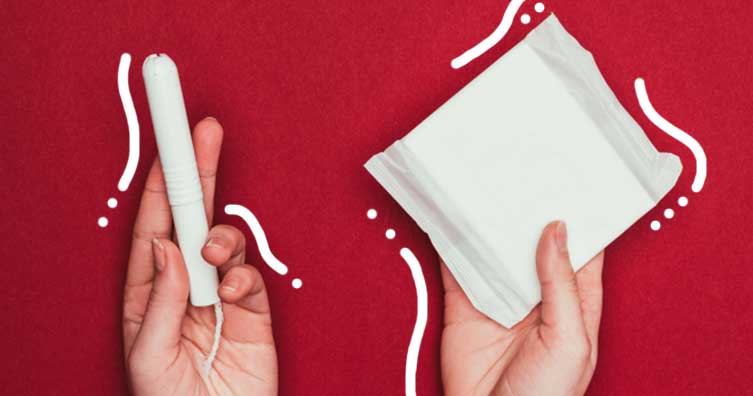 Sanitary products are necessities, so having to fork out for pricey pads and tampons hardly seems fair – and don't even get us started on the tampon tax.
Sanitary products are necessities, so having to fork out for pricey pads and tampons hardly seems fair – and don't even get us started on the tampon tax.
Women are thought to use an average of 22 products each period, despite many packs of sanitary pads including just 14 or less...
There are ways to avoid bulking up on these overpriced (and underfilled) packs, though. We'll talk you through the best ways to get free sanitary products at uni, along with the cheapest sanitary products to buy, to help you save money.
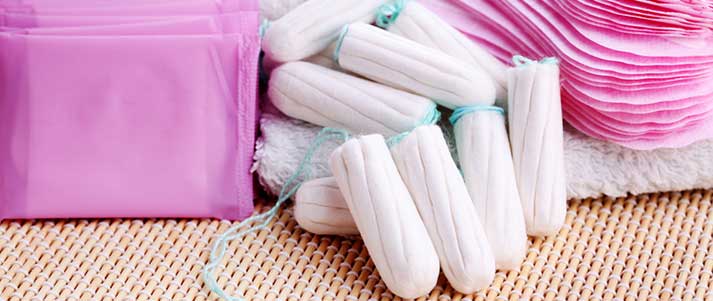 Different numbers often get thrown around when it comes to calculating the cost of periods.
Different numbers often get thrown around when it comes to calculating the cost of periods.
In 2018, Labour MP Danielle Rowley stated that periods cost women as much as £500 a year. This seems like an extravagant amount, but it takes into account extra things like pain relief and new underwear, plus comforts like chocolate and magazines.
We can't ignore the extra costs that can come with periods, but if we strip the figure down to the absolute essentials, it's much less.
To work out the average cost of sanitary products per period, it's worth noting that menstrual cycles are generally 28-days long, meaning women have around 13 periods a year.
It's been estimated that the average woman spends £4,800 in her lifetime on periods, using around 10,500 products for 480 periods (if she doesn't have any children). This works out at around £130 a year, or £10 a period.
This is still a pretty hefty amount, and a sum that many women can't afford. But, keep reading for ways to beat the average and pay a lot less – including how to get sanitary product for free!
 Tampon tax attracted public attention when a petition calling to scrap it reached over 320,000 signatures. The petition was launched by Laura Coryton in 2014 while she studying at Goldsmiths, University of London.
Tampon tax attracted public attention when a petition calling to scrap it reached over 320,000 signatures. The petition was launched by Laura Coryton in 2014 while she studying at Goldsmiths, University of London.
We chatted with Laura to find out more.
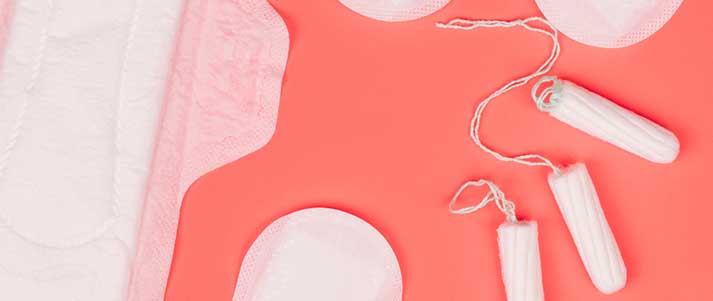 Good news for students in Scotland – since August 2018, free sanitary products have been available for all students at school, college and university there for free. But what about for students outside of Scotland?
Good news for students in Scotland – since August 2018, free sanitary products have been available for all students at school, college and university there for free. But what about for students outside of Scotland?
Many Students' Unions across the UK have committed to providing free sanitary products to students. Check directly with your SU to find out if your university does.
Even if your SU doesn't provide sanitary products in uni loos, it's worth having a chat with them about it. They may have some reserved for students who are struggling with money.
You could lobby your Students' Union for free sanitary products if they don't yet provide them – start by finding others from uni who agree that they should be freely available (shouldn't be hard!).
Then, as a group, you can approach the SU with a clear, confident argument why they need to get involved in tackling period poverty. The reasons are endless so, hopefully, this could be enough for them to start giving out sanitary products for free.
We hope your uni will provide free products, but there'll unfortunately still be times when you need to buy them (e.g. holidays and post-uni life). But don't worry! We've found you the cheapest deals on sanitary pads, tampons, menstrual cups and period pants.
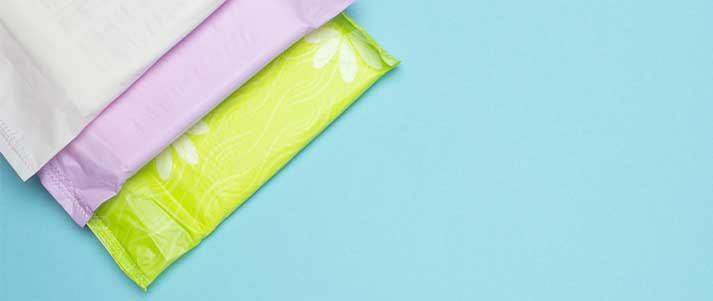 We'll start off with one of the most common forms of protection – sanitary pads.
We'll start off with one of the most common forms of protection – sanitary pads.
If you avoid the bigger names like Always and Tampax, and stick with supermarket-own brands instead, you could save a substantial amount.
Most people can't notice the difference when switching to own brands, but if you prefer to stick with what you know, the cheapest branded packs we've found are these Always Sensitive Normal Ultra Sanitary Towels for 95p (5.9p per pad).
If you want the cheapest possible option, the table below ranks the top five cheapest packs we've found. Note that these prices don't take into account special offers, so look out for any discounts that could get you an even better deal.
*Prices correct as of January 2020.
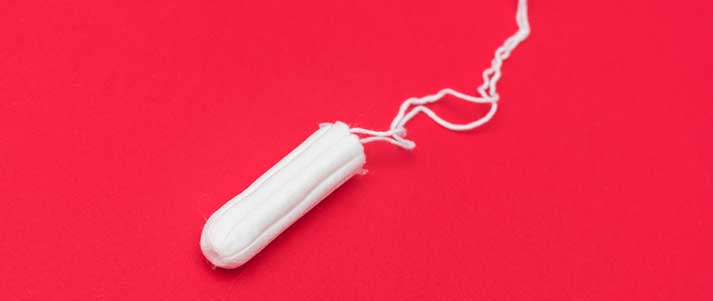 Tampons often work out slightly more expensive than pads, but for some, they're a necessity and a much more comfortable option.
Tampons often work out slightly more expensive than pads, but for some, they're a necessity and a much more comfortable option.
However, our table reveals that if you know where to look, you can get them for pretty much the same price as pads.
Again, if you want to stick with a known brand, these Tampax Cardboard Super Tampons with Applicator come in at £1.75 (or 8.8p per tampon).
However, the packs listed below will get you the best deal. Just note that all but one of these packs contain non-applicator tampons – although the own-brand versions with applicators still work out cheaper than the big brands.
*Prices correct as of January 2020.
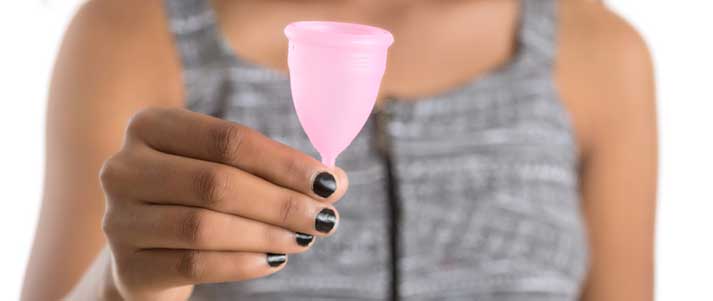 Menstrual cups can be a little pricey as a single purchase but, as they're reusable, they can save so much money in the long run. If you look after them properly and clean them regularly, they can last years.
Menstrual cups can be a little pricey as a single purchase but, as they're reusable, they can save so much money in the long run. If you look after them properly and clean them regularly, they can last years.
We asked Laura Coryton for her advice on how to save money on sanitary products, and she strongly recommended menstrual cups.
Essentially, menstrual cups are made of soft silicone, and you insert them in a similar way to tampons. However, rather than absorbing the blood as a tampon would, they collect it instead.
They can hold twice as much blood as tampons and can be worn for over eight hours, so it's perfectly okay to sleep and swim in them.
As plastic tampon applicators can take 100 years to degrade, reusable menstrual cups are a great way to avoid waste.
Most brands offer two different sizes, so you can choose the one that best suits your menstrual flow and body type.
We've picked out three of the most popular menstrual cups and ranked them by cost for you.
*There are cheaper menstrual cups available, but we recommend sticking to trusted brands for safety and reliability. These are three of the cheapest reliable branded menstrual cups.
**Prices correct as of January 2020.
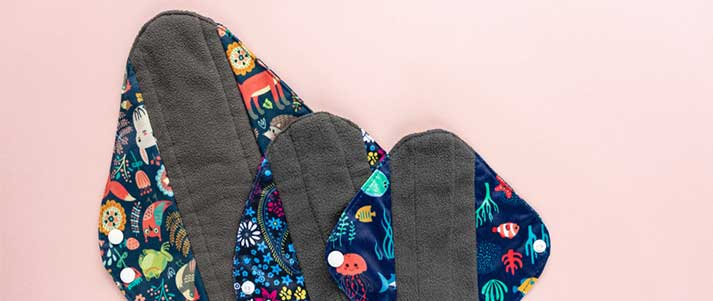 Reusable sanitary pads are pretty straightforward. They're just the same as sanitary pads, except you wash and rewear them.
Reusable sanitary pads are pretty straightforward. They're just the same as sanitary pads, except you wash and rewear them.
They're a great option if you want to save some money and help the environment, but they do take more effort. You'll have to keep on top of your washing for a start...
Like disposable sanitary pads, different reusable pads are available for light, medium and heavy flows.
In Precious Stars' budget range, moderate reusable pads cost £3.50. You can get pantyliners, moderate pads or overnight pads, depending on how heavy your flow is.
Earthwise Girls sell washable pads for slightly more at around £4.50 each. But, you can buy a pack of three for £13.50, which includes a pad donation to an orphaned girl in Kenya.
Admittedly you'll have to get a lot of wear out of a reusable sanitary pad for it work out the same value for money as normal pads, but the idea is that if you buy in bulk, you won't need to replace your pads for another five years.
You could also try making your own if you know your way around a needle and thread. You'll need to head down to a fabric shop to get the material you need (including some waterproof fabric) and Sewing Bee Fabrics have an easy-to-follow pattern you can use.
If you find you're a dab hand at it, you could even set up your own reusable sanitary towel business.
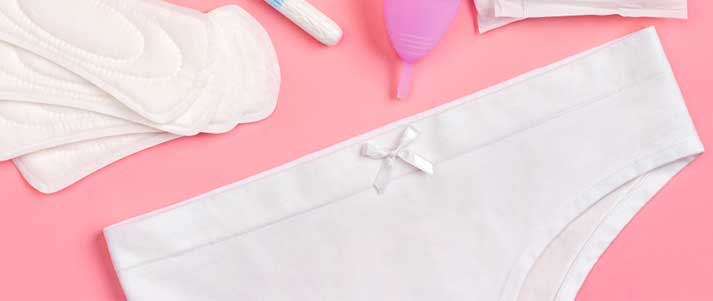 Yep, you can now buy underwear with period protection built in! It's the dream.
Yep, you can now buy underwear with period protection built in! It's the dream.
Period pants (or menstrual underwear) contain hidden protection that stops leaks, and just like reusable sanitary pads they can be washed and worn again. However, always check the small print before you buy, as some only offer 'added protection' to wear alongside other sanitary products.
This is the case with Pretty Clever Pants – they have a waterproof panel that offers extra protection, but you'll still need to wear normal sanitary products. You can get a pack of two for £16.99.
Modibodi are one of the leading names in period underwear, and they're a good choice if you want to ditch disposable sanitary products and just wear the pants. Their undies for moderate-heavy absorbancy cost from £21.50 and hold two-three tampons' worth.
Flux Undies can be worn for up to twelve hours without tampons and pads. They're usually a bit pricier, costing from £24.95 for light absorbency, but these hold up to two tampons' worth. If you spend a few pounds more, you can get pants that hold over four tampons' worth.
To get rid of disposable products altogether, you'd need to invest in several pairs of period pants so you could change into fresh ones as often as required – this is likely to be a costly approach, so we'd suggest sticking to reusable sanitary pads if you can.
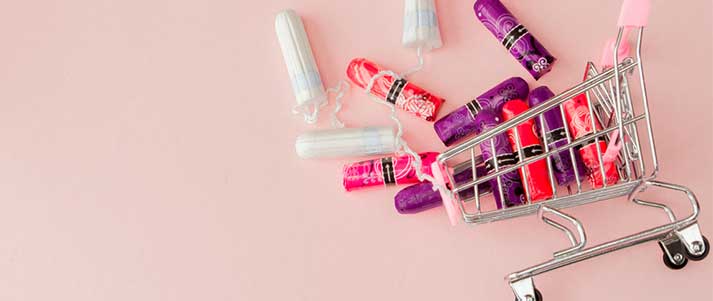 You've probably worked this out by now, but the number one thing you can do to save money on your period is downshifting to own brands.
You've probably worked this out by now, but the number one thing you can do to save money on your period is downshifting to own brands.
Always and Bodyform might be your usual go-to brands, but most people report virtually no difference when they switch to supermarket own brands.
If you're worried, you could even compromise by using the products you're most comfortable with when your flow is heaviest, and use the cheaper brands when it's lighter. You'll still be saving yourself cash in the long run!
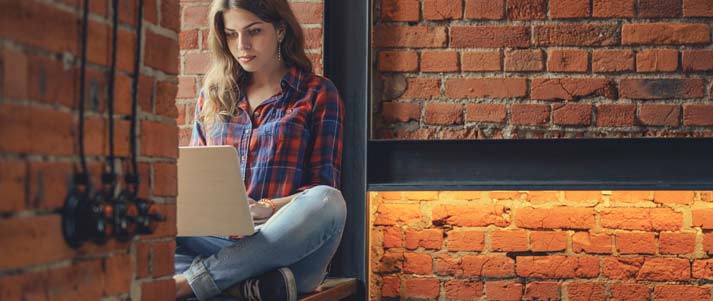
We've done a lot of the hard work for you here by pricing up the cheapest period products, but everyone has different requirements.
Perhaps you need pads with wings or tampons with applicators. Instead of going out and buying the first pack you see, have a look at price comparison sites first to find your cheapest option.
Sanitary Saver is a price comparison site specifically for period products, but we did notice a few products were missing when we tried it. If you're after a particular product, you may be better off checking a few sites yourself.
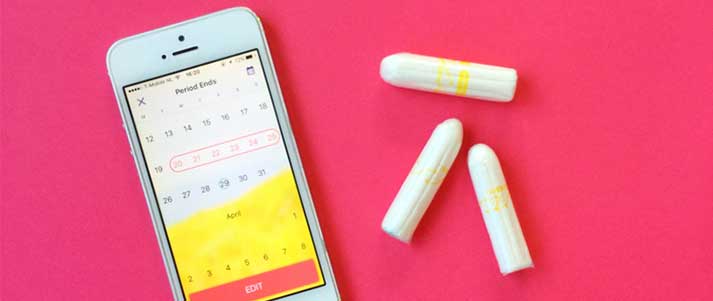 If your period isn't too regular, or you just struggle to keep up with it, you can end up paying more to replace underwear and bedding that gets hit when you're caught out. We've all been there, but you could try using a period tracking app to stay on top of your cycle.
If your period isn't too regular, or you just struggle to keep up with it, you can end up paying more to replace underwear and bedding that gets hit when you're caught out. We've all been there, but you could try using a period tracking app to stay on top of your cycle.
For example, Clue not only tracks your period, but also your PMS and lets you know when you're likely to feel a certain way – like which days you're most likely to devour a tub of Ben & Jerry's and cry over soppy films.
Flo is a great option for those with irregular periods, using artificial intelligence to predict your cycle. However, both Clue and Flo come with a monthly subscription fee if you want to use their extra features.
Natural Cycles is the only app that has been certified as a form of contraception, proven to be 98% effective with perfect use (i.e. all usage instructions correctly followed). However, for birth control, we'd still recommend using it with another form of contraception like condoms to be on the safe side.
For tracking your menstrual cycle, though, Natural Cycles is great. It uses an oral thermometer to track your body's temperature (which changes throughout your menstrual cycle) and creates an accurate ovulation calendar based on its readings.
To use it, you'll have to pay a £6.99 monthly subscription fee (or £49.99 for the year).

If you're unable to afford sanitary products at all, then try talking to your student union.
As mentioned earlier, many SUs are already providing sanitary products for free. But, if yours isn't, let them know that you're struggling to cover the costs, and see if they'd be willing to start offering out free one.
Other unis have also cut prices of sanitary products in SU shops, so make sure to check these yourself as they won't appear on price comparison apps.
Laura Coryton told us:
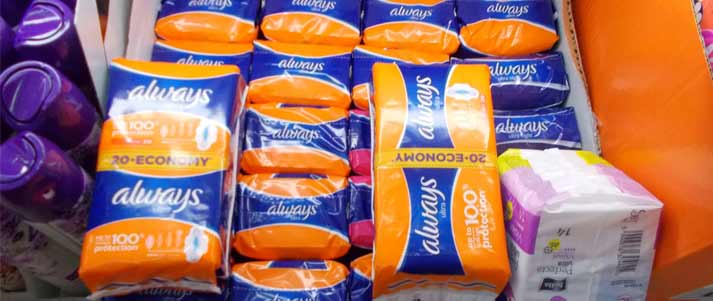 By following our advice, you could save a significant amount on your sanitary products by downshifting brands – or even more if you go for reusable products instead.
By following our advice, you could save a significant amount on your sanitary products by downshifting brands – or even more if you go for reusable products instead.
Worryingly, many women can't afford any sanitary products at all, which impacts their daily life, health and education. Plan International UK's research from 2017 found that 10% of girls had been unable to afford sanitary products.
If you're able to, you could always take the money you save and put it towards providing sanitary products to those who need them.
Bloody Good Period provides menstrual products to asylum seekers, refugees and those who can't afford them. You can either send a cash donation or buy a product from their shop (all profits go towards their pad fund) – donate here.
You could check with your local food bank to see if they accept/need donations of sanitary products, or find out whether your SU is organising a collection.
You can also buy boxes of 10 sanitary pads from Hey Girl for £3.25, and for each pack sold they'll donate a pack to girls and women in need.
Similarly, if you buy a menstrual cup from The Cup Effect for £24, they'll donate two cups to women or girls living on low incomes in East Africa or the UK.

Credit: LightField Studios – Shutterstock
Women are thought to use an average of 22 products each period, despite many packs of sanitary pads including just 14 or less...
There are ways to avoid bulking up on these overpriced (and underfilled) packs, though. We'll talk you through the best ways to get free sanitary products at uni, along with the cheapest sanitary products to buy, to help you save money.
Many women around the world can't afford even the most basic sanitary products, so if you are able to spare some cash, make sure to donate too.
How much do periods cost?

Credit: matka_Wariatka – Shutterstock
In 2018, Labour MP Danielle Rowley stated that periods cost women as much as £500 a year. This seems like an extravagant amount, but it takes into account extra things like pain relief and new underwear, plus comforts like chocolate and magazines.
We can't ignore the extra costs that can come with periods, but if we strip the figure down to the absolute essentials, it's much less.
To work out the average cost of sanitary products per period, it's worth noting that menstrual cycles are generally 28-days long, meaning women have around 13 periods a year.
It's been estimated that the average woman spends £4,800 in her lifetime on periods, using around 10,500 products for 480 periods (if she doesn't have any children). This works out at around £130 a year, or £10 a period.
This is still a pretty hefty amount, and a sum that many women can't afford. But, keep reading for ways to beat the average and pay a lot less – including how to get sanitary product for free!
What is the tampon tax?

Credit: Pormezz – Shutterstock
We chatted with Laura to find out more.
In May 2014, my friend sent me an article when tampon tax was initially reduced from 17.5% to 5% in 2001, thanks to amazing campaigners like Dawn Primarolo MP.When Laura started looking into the tampon tax, she was pretty shocked...
When I initially read this article I thought 'maybe it makes sense... maybe everything else is taxed higher?' as I knew absolutely nothing about taxation!
As soon as I started digging into our tax laws, I realised tampon tax is so wrong.Following the widespread success of the petition, politicians began taking notice and making moves to change the law – so, when can we expect to see a zero-rate on sanitary products in the UK?
While we are taxed for period products, classed as 'luxuries', we aren't taxed for the 'essential' purchase of maintaining our private helicopters, bingo or exotic meats including crocodile and horse. Horse!
This made me angry. So I started the petition!
By 2022 at the latest. It's so frustrating, but we're getting there!For the official axing of tampon tax, we need to wait for either one of these things to happen:
Firstly, our tampon-tax-ending legislation to go through the European Parliament.And in what ways could the UK's move to end tampon tax influence other countries?
This piece of period law has been accepted by the EU, it's just going through the technical process which is taking a while... The EU has said this will be made law by the end of 2021.
Secondly, we're waiting for Brexit. Whichever happens first will be when tampon tax is axed.
This month, the House of Commons created a new briefing note which explained the government is still committed to axing tampon tax "as soon as legally possible". We're nearly there!
It will be huge! We have sister campaigns across the world. We all celebrate when a country wins their fight. It makes every campaign stronger.Some shops, including Tesco, Waitrose, Morrisons, Sainsbury's and Co-op have slashed prices on sanitary products to combat the tampon tax – but read on to find out which products are actually the cheapest.
If England can do it, then so can any country! Also this piece of EU law will legally make it so much easier for countries to lower or axe this tax. It will be amazing.
How to get free sanitary products

Credit: ADfoto – Shutterstock
Many Students' Unions across the UK have committed to providing free sanitary products to students. Check directly with your SU to find out if your university does.
Even if your SU doesn't provide sanitary products in uni loos, it's worth having a chat with them about it. They may have some reserved for students who are struggling with money.
You could lobby your Students' Union for free sanitary products if they don't yet provide them – start by finding others from uni who agree that they should be freely available (shouldn't be hard!).
Then, as a group, you can approach the SU with a clear, confident argument why they need to get involved in tackling period poverty. The reasons are endless so, hopefully, this could be enough for them to start giving out sanitary products for free.
We hope your uni will provide free products, but there'll unfortunately still be times when you need to buy them (e.g. holidays and post-uni life). But don't worry! We've found you the cheapest deals on sanitary pads, tampons, menstrual cups and period pants.
Cheapest sanitary pads

Credit: La corneja artesana – Shutterstock
If you avoid the bigger names like Always and Tampax, and stick with supermarket-own brands instead, you could save a substantial amount.
Most people can't notice the difference when switching to own brands, but if you prefer to stick with what you know, the cheapest branded packs we've found are these Always Sensitive Normal Ultra Sanitary Towels for 95p (5.9p per pad).
If you want the cheapest possible option, the table below ranks the top five cheapest packs we've found. Note that these prices don't take into account special offers, so look out for any discounts that could get you an even better deal.
Cheapest sanitary pads
| Product | Price* | Price per pad |
|---|---|---|
| Tesco Essentials Maxi Towels x10 | 23p | 2.3p |
| ASDA Protect Ultra Normal Sanitary Towels without wings x16 | 54p | 3.4p |
| Tesco Free Spirit Maxi Towels Regular x24 | 85p | 3.5p |
| Morrisons Normal Ultra Towels without wings x16 | 65p | 4.1p |
| Sainsbury's Ultra Towels Normal Wings x14 | 65p | 4.6p |
Cheapest tampons

Credit: Anastasiya 99 – Shutterstock
However, our table reveals that if you know where to look, you can get them for pretty much the same price as pads.
Again, if you want to stick with a known brand, these Tampax Cardboard Super Tampons with Applicator come in at £1.75 (or 8.8p per tampon).
However, the packs listed below will get you the best deal. Just note that all but one of these packs contain non-applicator tampons – although the own-brand versions with applicators still work out cheaper than the big brands.
Cheapest tampons
| Product | Price* | Price per tampon |
|---|---|---|
| ASDA Protect Super Non Applicator Tampons x32 | 80p | 2.5p |
| Sainsbury's Tampons Non Applicator Super x32 | £1.25 | 3.9p |
| Tesco Super Plus Non Applicator Tampons x24 | 95p | 4p |
| ASDA Regular Applicator Tampons x20 | 80p | 4p |
| Boots Liberelle Non Applicator Tampon Regular x24 | £1.10 | 4.6p |
Cheapest menstrual cups

Credit: Dipak Shelare – Shutterstock
We asked Laura Coryton for her advice on how to save money on sanitary products, and she strongly recommended menstrual cups.
Menstrual cups aren't for everyone, but they are absolutely amazing. I am a huge fan!At the University of Oxford, where Laura studied her master's, they did actually provide free menstrual cups, so it's definitely worth lobbying your SU. And at Goldsmiths, where she studied as an undergrad, they reduced the price of their period products to a not-for-profit rate.
You buy one cup... which you can use for 10 years. You'll never need to buy period products for a decade.
They're environmentally and economically friendly and you could lobby your student union into giving these out to students for free!
Essentially, menstrual cups are made of soft silicone, and you insert them in a similar way to tampons. However, rather than absorbing the blood as a tampon would, they collect it instead.
They can hold twice as much blood as tampons and can be worn for over eight hours, so it's perfectly okay to sleep and swim in them.
As plastic tampon applicators can take 100 years to degrade, reusable menstrual cups are a great way to avoid waste.
Most brands offer two different sizes, so you can choose the one that best suits your menstrual flow and body type.
We've picked out three of the most popular menstrual cups and ranked them by cost for you.
Cheapest menstrual cups
| Product* | Wear for up to | Holds (tampons absorb 6–19ml) | Price** |
|---|---|---|---|
| Mooncup | 8 hours | 28.8–29.3ml | £21.99 |
| Ruby Cup from The Cup Effect | 12 hours | 34ml | £24 |
| Intimina Lily Cup One – Beginner's Foldable Menstrual Cup | 12 hours | 20ml | £24 |
**Prices correct as of January 2020.
Keen to reduce your plastic waste? Check out our guide to going plastic-free on a budget.
Cheapest reusable sanitary pads

Credit: StaCheck – Shutterstock
They're a great option if you want to save some money and help the environment, but they do take more effort. You'll have to keep on top of your washing for a start...
Like disposable sanitary pads, different reusable pads are available for light, medium and heavy flows.
In Precious Stars' budget range, moderate reusable pads cost £3.50. You can get pantyliners, moderate pads or overnight pads, depending on how heavy your flow is.
Earthwise Girls sell washable pads for slightly more at around £4.50 each. But, you can buy a pack of three for £13.50, which includes a pad donation to an orphaned girl in Kenya.
Admittedly you'll have to get a lot of wear out of a reusable sanitary pad for it work out the same value for money as normal pads, but the idea is that if you buy in bulk, you won't need to replace your pads for another five years.
You could also try making your own if you know your way around a needle and thread. You'll need to head down to a fabric shop to get the material you need (including some waterproof fabric) and Sewing Bee Fabrics have an easy-to-follow pattern you can use.
If you find you're a dab hand at it, you could even set up your own reusable sanitary towel business.
Cheapest period pants

Credit: RomarioIen – Shutterstock
Period pants (or menstrual underwear) contain hidden protection that stops leaks, and just like reusable sanitary pads they can be washed and worn again. However, always check the small print before you buy, as some only offer 'added protection' to wear alongside other sanitary products.
This is the case with Pretty Clever Pants – they have a waterproof panel that offers extra protection, but you'll still need to wear normal sanitary products. You can get a pack of two for £16.99.
Modibodi are one of the leading names in period underwear, and they're a good choice if you want to ditch disposable sanitary products and just wear the pants. Their undies for moderate-heavy absorbancy cost from £21.50 and hold two-three tampons' worth.
Flux Undies can be worn for up to twelve hours without tampons and pads. They're usually a bit pricier, costing from £24.95 for light absorbency, but these hold up to two tampons' worth. If you spend a few pounds more, you can get pants that hold over four tampons' worth.
To get rid of disposable products altogether, you'd need to invest in several pairs of period pants so you could change into fresh ones as often as required – this is likely to be a costly approach, so we'd suggest sticking to reusable sanitary pads if you can.
It's well worth signing up for product testing panels – you could get sent free toiletries from market research companies.
Top tips for saving money on sanitary products
Downshift to supermarket-own brand items

Credit: Volodymyr Maksymchuk – Shutterstock
Always and Bodyform might be your usual go-to brands, but most people report virtually no difference when they switch to supermarket own brands.
If you're worried, you could even compromise by using the products you're most comfortable with when your flow is heaviest, and use the cheaper brands when it's lighter. You'll still be saving yourself cash in the long run!
Check price comparison sites

We've done a lot of the hard work for you here by pricing up the cheapest period products, but everyone has different requirements.
Perhaps you need pads with wings or tampons with applicators. Instead of going out and buying the first pack you see, have a look at price comparison sites first to find your cheapest option.
Sanitary Saver is a price comparison site specifically for period products, but we did notice a few products were missing when we tried it. If you're after a particular product, you may be better off checking a few sites yourself.
Use period tracking apps so you don't get caught out
Credit: Maryna Maroz – Shutterstock
For example, Clue not only tracks your period, but also your PMS and lets you know when you're likely to feel a certain way – like which days you're most likely to devour a tub of Ben & Jerry's and cry over soppy films.
Flo is a great option for those with irregular periods, using artificial intelligence to predict your cycle. However, both Clue and Flo come with a monthly subscription fee if you want to use their extra features.
Natural Cycles is the only app that has been certified as a form of contraception, proven to be 98% effective with perfect use (i.e. all usage instructions correctly followed). However, for birth control, we'd still recommend using it with another form of contraception like condoms to be on the safe side.
For tracking your menstrual cycle, though, Natural Cycles is great. It uses an oral thermometer to track your body's temperature (which changes throughout your menstrual cycle) and creates an accurate ovulation calendar based on its readings.
To use it, you'll have to pay a £6.99 monthly subscription fee (or £49.99 for the year).
Ask your Student Union for support

If you're unable to afford sanitary products at all, then try talking to your student union.
As mentioned earlier, many SUs are already providing sanitary products for free. But, if yours isn't, let them know that you're struggling to cover the costs, and see if they'd be willing to start offering out free one.
Other unis have also cut prices of sanitary products in SU shops, so make sure to check these yourself as they won't appear on price comparison apps.
Laura Coryton told us:
Lots of universities have been lobbied by their students to either sell period products at a not-for-profit rate at their SU shops or even provide them for free in student bathrooms.
Many have done this! It's amazing because these student activists have actively tackled both period poverty and period stigma by proposing motions to the SU on period product provision. They are my heroes.
Where to donate sanitary products

Credit: Gsvadds - Wikimedia
Worryingly, many women can't afford any sanitary products at all, which impacts their daily life, health and education. Plan International UK's research from 2017 found that 10% of girls had been unable to afford sanitary products.
If you're able to, you could always take the money you save and put it towards providing sanitary products to those who need them.
Bloody Good Period provides menstrual products to asylum seekers, refugees and those who can't afford them. You can either send a cash donation or buy a product from their shop (all profits go towards their pad fund) – donate here.
You could check with your local food bank to see if they accept/need donations of sanitary products, or find out whether your SU is organising a collection.
You can also buy boxes of 10 sanitary pads from Hey Girl for £3.25, and for each pack sold they'll donate a pack to girls and women in need.
Similarly, if you buy a menstrual cup from The Cup Effect for £24, they'll donate two cups to women or girls living on low incomes in East Africa or the UK.
Dealing with periods at university can be stressful – make sure you take time for yourself and look after your mental health.
from Fruitty Blog https://ift.tt/3fQT7fH
via IFTTT
No comments:
Post a Comment